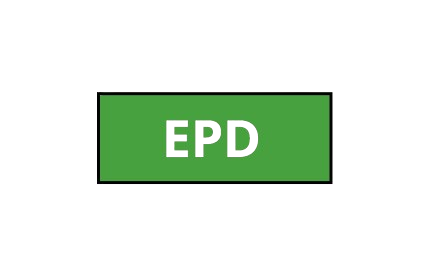EPD – ENVIRONMENTAL PRODUCT CERTIFICATION
It improves the environmental performance of a product, throughout its life cycle.

The EPD (Environmental Product Declaration) is a certified environmental product declaration, which provides environmental data on the life cycle of products in accordance with the international ISO 14025 standard.
An EPD presents quantified environmental information on the life cycle of a product, in order to allow for comparisons between products performing the same function.
This statement is based on verified life cycle assessment (LCA) data in an independent manner, life cycle inventory (LCI) analysis data and, where relevant, additional environmental information.
The EPD certification is managed and published by independent programme operators, who vary according to the country of publication or the company’s market and product sector.
EPDs are mainly intended for use in business-to-business (B2B) communication, but are increasingly being used in business-to-consumer (B2C) communication.
How is the EPD certification obtained?
Greenwich supports the company during all stages of the procedure from a technical point of view, in the preparation of the LCA report, as well as strategically in the choice of the programme operator and in the way certification is communicated.
The certification process consists of 5 steps:
- Drafting of the LCA report and assessment of environmental impacts according to the reference PCR.
- Choice of programme operator and independent certifier
- Preparation of the EPD document
- Third-party audit
- Publication of the EPD document on the platform of the chosen programme operator.
Benefits of EPD certification for the company
Undertaking EPD certification for a company has several benefits:
- compliance with current legislation, which requires the assessment of environmental impacts according to LCA methodology, through the publication of CAM;
- improvement of the environmental performance of its product;
- responding to customer needs through communication in terms of environmental impact.
Life Cycle Assessment (LCA)
The Life Cycle Assessment is an international, standardised methodology for assessing the environmental impact of products and services throughout the entire life cycle (from cradle to grave) of a product or service.
The LCA is standardised by ISO 14040 and 14044, which define the guidelines for applying the methodology, dividing it into 4 stages:
- Definition of the objective and scope.
- Inventory analysis.
- Analysis of environmental impacts.
- Interpretation of results.
The Life Cycle Assessment allows for the impact of a product or service to be assessed according to the most common environmental indicators:
- Carbon Footprint.
- Water Footprint.
- Human and environmental toxicity.
- Degradation of resources.
- Energy consumption, etc.
The LCA is the methodological basis for several environmental certifications that allow for the communication of impacts to end customers. They also allow for the quantification of impacts useful to implement mitigation and compensation projects.
Greenwich has been carrying out environmental impact assessments according to the LCA methodology for its customers for over 13 years.
Product certifications obtained from Life Cycle Assessment studies
Environmental Product Declaration (EPD) Product Environmental Footprint (PEF) Carbon Footprint (CF) Water Footprint (WF) Cradle to Cradle (C2C) Remade in Italy Contact our experts.